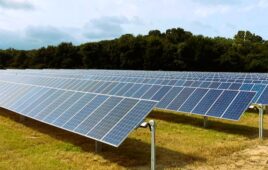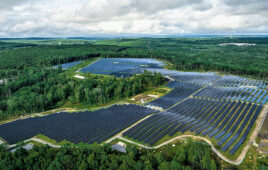The news traveled fast after President Trump enforced 30% tariffs on imported solar cells and panels. The large majority of industry stakeholders expressed disappointment with the results. What follows are various quotes from U.S. solar industry professionals.
Julia Hamm, President and CEO of the Smart Electric Power Alliance (SEPA)
“A robust, competitive solar market is essential to the United States’ transition to the clean, safe, affordable and resilient energy future that SEPA and all its members are working toward. The President’s action in the solar trade case will trigger economic disruptions in many segments of the industry, thus threatening our common vision and the many benefits clean energy can bring to American consumers and businesses.
“The challenge that lies before us will be to concentrate our efforts on accelerating the innovation and efficiency that will drive down costs across other parts of the energy value chain. For example, SEPA has partnered with the Department of Energy and other stakeholders on the Orange Button initiative, which is already helping to lower financing and other soft costs for solar projects. It is but one example of the kind of solutions our industry will develop to benefit utilities, consumers, the solar industry and the grid — regardless of federal policy decisions.”
Juergen Stein, CEO and President of SolarWorld Americas, one of the panel companies that submitted the tariff request to the government
“SolarWorld Americas appreciates the hard work of President Trump, the U.S. Trade Representative, and this administration in reaching today’s decision, and the President’s recognition of the importance of solar manufacturing to America’s economic and national security. We are still reviewing these remedies, and are hopeful they will be enough to address the import surge and to rebuild solar manufacturing in the United States. We will work with the U.S. Government to implement these remedies, including future negotiations, in the strongest way possible to benefit solar manufacturing and its thousands of American workers to ensure that U.S. solar manufacturing is world-class competitive for the long term.”
Coalition for Community Solar Access (CCSA) Executive Director Jeff Cramer
“We’re disappointed with the Trump Administration’s decision to impose tariffs on the solar industry, one of the fastest growing sectors of our economy. However, today’s announcement does nothing to slow the momentum or dampen the excitement for community solar. More and more states are turning to community solar due to its proximity to customers, innovation in product designs, and strong customer demand. We expect these advantages, combined with strong-state level support for projects, will result in community solar being able to weather these tariffs and remain a bright spot in the U.S. solar market. Ultimately, the demand for clean, local and affordable energy puts the community solar industry in position to continue to invest, create new jobs, and serve millions of customers across the country who have been waiting for their opportunity to choose solar.”
Erica Mackie, CEO and co-founder of GRID Alternatives
“The Trump Administration’s decision to impose tariffs and quotas on solar panels is a setback for clean energy and jobs in frontline communities. Declining solar costs have been critical to the growth of solar as a tool for states, cities and utilities to provide energy bill assistance to low-income customers, and the growing industry has created tens of thousands of good jobs. Solar jobs are accessible to people with no advanced degrees, creating pathways out of poverty in some of our most disadvantaged communities. The tariffs announced today, while not as severe as they could have been, will likely dampen job growth and make it harder for families to get relief from high energy costs. GRID Alternatives is committed to continuing our important work toward a transition to clean energy that includes everyone, and will work with our government, industry and community partners to minimize the impact of the tariffs.”
Constantino Nicolaou, CEO of mounting manufacturing company PanelClaw
“The White House’s decision on the most outrageous solar trade case to date was announced yesterday. The new tariffs will have a disproportionately bad impact on our friends in the utility scale PV space. Make no mistake about it, the solar train left the station several years ago in the U.S. and while it will slow down now on its trek to become our primary energy source, it will not be stopped! It is also important to note that the press release from USTR was completely accurate in that the USTR and the administration from Treasury to Commerce to DOE, to the President’s advisors took the time to collect information and meet with the industry before making a decision. We may not have achieved the desired outcome of no tariffs, but I am personally encouraged by the process and by the possibility put on the table by Ambassador Lighthizer to also settle the anti-dumping and retaliatory polysilicon tariff issues. That is a negotiation worth having as it can ultimately lead us to accelerating the train again in the U.S. The battle to create and save solar jobs while ensuring a brighter energy future for our great country and the world continues!”
Emily Kirsch, founder of clean energy investment company Powerhouse
“We at Powerhouse strongly condemn President Trump’s decision to impose import tariffs on solar panels. This decision will cause job losses across the industry and are a needless hit to the economy. However, the silver lining is that the tariff’s are lower than what Suniva and SolarWorld were asking for, and the solar industry is too large and established to stop growing.”
Gregory Wetstone, president and CEO, American Council on Renewable Energy (ACORE)
“The President’s decision to impose a 30 percent tariff on solar cells and modules will raise electricity prices even as it costs jobs in the solar energy sector. Make no mistake, this is the government intervening in the marketplace to reduce the expansion of solar energy. Typically, tariffs bring benefits to the American workforce that must be weighed against the higher costs they impose on consumers. In this case, however, thousands of jobs will be lost across the solar development and installation sectors, and among companies that manufacture solar components such as inverters and racking systems. Meanwhile, American consumers and companies will have to pay more for solar technology that continues to drive growth across the globe. While we are confident that the American solar sector will remain vibrant, this is a needless drag on an important source of domestic investment and job creation.”
Anne Hoskins, chief policy officer, Sunrun
“The outcome of the solar trade case is contrary to the will of consumers, bipartisan elected officials, many military personnel, and the 99% of American solar workers who will be harmed by these tariffs. We need state governors, legislators and public utility commissions with huge solar workforces, from South Carolina to New York to California, to adopt policies and regulations to overcome the cost increases and job impacts from solar tariffs. Now more than ever, states must step up so solar can continue to lead the transition to a more resilient and clean energy system.”
Adam Browning, executive director, Vote Solar
“America’s solar industry enhances our national security and has created hundreds of thousands of jobs across all fifty states. It’s an American success story, reliably delivering on many of the campaign promises of this Administration.
“There are a lot of ways to further support the growth of U.S. renewable energy manufacturing; this job-killing tariff is not one of them. Instead, this misguided decision to impose tariffs on solar products will negatively impact thousands of workers who depend on solar to support their families, and it will hurt American competitiveness in the global economy.
“That said, we know that American voters from both sides of the aisle are overwhelmingly on the side of solar progress. We are committed to working with state and local leaders to overcome these setbacks from Washington and turn public will into real clean energy action. We need their leadership now more than ever.”
BlueWave Solar CEO Trevor Hardy
“It is unfortunate that the Trump administration sided with two foreign-owned companies and does not seem to appreciate the impact on the overall value chain in a transforming and growing industry. This tariff will undoubtedly impact American small businesses, such as our installer partners, but BlueWave will push through any obstacle on our way to providing solar to everyone, everywhere.”
Mark Sylvia, BlueWave’s Managing Director for External Affairs
“The U.S. solar industry is creating real and sustainable jobs every single day and it is very sad that the administration has injected politics into this industry of the future. Those in Washington claim to fight for workers, but thousands of families will lose because of this decision. Trump thinks this is an American industry win, but it is a definite loss for American families.”
Doug Hertz, president and CEO, Sunrise Solar Solutions:
“Although we are disappointed in the President’s decision to impose a 30% tariff on solar panels, our commitment to our pricing, our customers and the solar industry is relentless and stronger than ever before. We are passionate about our work and our industry. And, we stand by our customers as always in delivering the best solar panels available and maintaining our current prices and quotes. The Sunrise Solar Solutions team of installers and solar specialists are unstoppable, and our hard work and strong commitment to quality and our customers will prevail — and we are certain that the solar industry boom will continue on its rise without any pause.”
Randy Wheeless, spokesman, Duke Energy
“Our customers expect solar to be a key component of an affordable and clean energy generation mix. Duke is a leader in renewable energy generation and solar is an integral part of Duke Energy’s investment strategy throughout the nation. We are planning a significant number of projects across our commercial and regulated businesses. The imposition of this tariff will increase customer costs and hurt our ability to deliver on that promise.
“We will continue to invest in this resource. But we are carefully evaluating the economics of each of our solar projects with a focus on minimizing adverse impacts on our investments and costs to customers while supporting the growth of renewable energy. Duke Energy currently owns more than 800 megawatts of solar power capacity, and plans to build and procure more than 3,000 MW over the next five years.”
Logan Landry, CEO, Sigora Solar
“In recent years, the solar industry created more than 260,000 jobs while other industries reduced jobs. Solar also hired workers 17 times faster than the U.S. economy as a whole. This decision by the administration will only hurt the fastest-growing job-producing industry in the nation. However, we do appreciate the President’s decision to reduce the initial ask by the U.S. International Trade Commission from 50 percent to 30 percent, subsequently reducing the tariff by 5 percent each year.
“As soon as the tariff became an issue in May 2017, Sigora Solar launched two key strategies to minimize the tariff’s impact on customers. We streamlined our processes and reduced operating costs, while making bulk purchases of solar panels and equipment.
“Our strategies reduce the cost of solar, and because of these actions, we don’t anticipate the tariffs to result in price increases for our future customers. Moreover, because we believe this tariff is targeted at Asian exports, we’ve strengthened our relationships with manufacturers in Canada and other nations around the world.
“The Virginia market is incredibly young and has more room for growth than virtually any market in the country. We will continue to provide the state’s most comprehensive and affordable solar power products and services. With Sigora Solar, Virginians will continue to have a choice for their energy needs, and will save money with our ‘Produce and Reduce’ program.”
Story will be updated as more comments become available





What about solar panels in geodesic domes ?? We will be experiencing an influx of seniors in assisted living facilities that need safe and energy efficient housing.